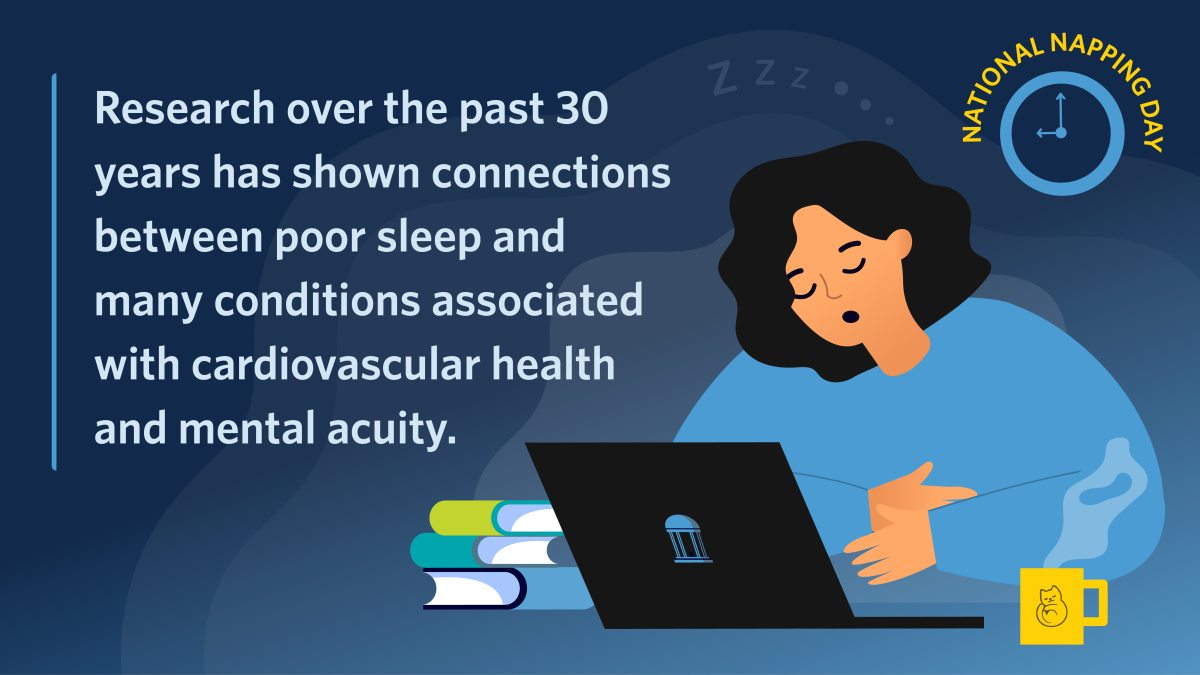Sleep researcher offers 5 tips on napping
On National Napping Day, UNC School of Medicine’s Mary Ellen Wells advises paying attention to the need to sleep.

March 11 is National Napping Day. Before celebrating with a nap, learn from a UNC-Chapel Hill sleep expert who says consistent sleepiness and a need for naps may point to serious health problems.
Mary Ellen Wells, an associate professor in the UNC School of Medicine’s health sciences department, directs the neurodiagnostics and sleep science program, which offers a Bachelor of Science degree. Graduates become certified sleep technologists and conduct neurophysiological testing, such as brainwave testing, used in the study of sleep called polysomnography.
Wells offers some insights on the relationship between the body’s need for sleep and napping.
If you need a nap every day, consider talking with your doctor.
Our circadian rhythm governs our sleep. Everyone feels a dip in that rhythm, usually after lunchtime. Maybe you regularly feel the need to nap, feel sleepy during the day, or start to doze off while sitting at a traffic light. Those are signs of a larger issue, and it’s probably a good idea to talk with your doctor. Nearly 100 different sleep disorders exist that could be lurking under the surface. Some of those, such as sleep apnea, are deadly. Research over the past 30 years has shown connections between poor sleep and many conditions associated with cardiovascular health and mental acuity.
Nap length is important but consider the bigger picture.
Keep naps short and don’t take them too late. Many recommendations are for 20 minutes or less, but let’s be realistic. Can you even get to sleep that quickly? Look at the bigger picture of what healthy sleep is supposed to look like because it’s more than just going to sleep then waking up. While you sleep, your brain is very active. We know that you cycle through two sleep stages — non-REM (rapid eye movement) and REM sleep. Non-REM is differentiated into three stages representing light-to-deep sleep. You cycle through stages four to five times a night, about every 90 to 120 minutes. Long naps, say over an hour, can disrupt your circadian rhythm and make it more difficult to fall asleep at night. They also increase the chance you’ll reach deeper sleep and wake up from a nap feeling tired and irritable.
Nap early and prepare simply.
Napping earlier in the day is better. Just like at night, keep your room dark, cool, quiet. Third-shift workers may sleep during the day with blackout curtains and things like that. I don’t recommend getting set up that nicely, but you may need it if you have a hard time napping outside of your regular bedtime or comfort zone. Afternoon naps closer to bedtime can contribute to insomnia.
Repay your sleep debt.
If you feel sleepy, you can only rev yourself up to a certain extent. A cup of coffee or walking around won’t decrease your body’s need for sleep. The issue is you’re lacking sleep somewhere, whether you’re losing it night after night, or perhaps you had one bad night and missed some sleep. You’ve accumulated sleep debt that needs to be repaid.
Don’t drive drowsy.
If you’re driving and start dozing off, pull over and take a nap. Drowsy driving is as dangerous as drunk driving, if not more dangerous. Grabbing a cup of coffee, rolling down the window, turning up the music are just temporary fixes for a bigger problem. It just doesn’t last long enough.







